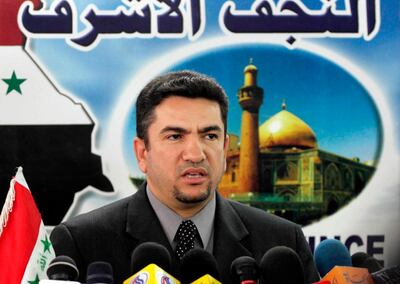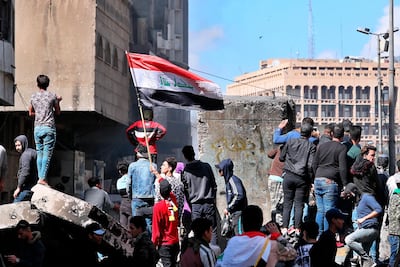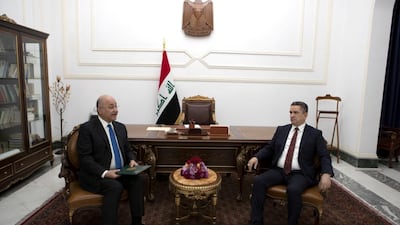Three months since the resignation of Prime Minister Adel Abdul Mahdi, Iraq has a prime minister designate.
Adnan Al Zurfi, a name that emerged suddenly, has now been appointed to the prime minister post by Iraqi President Barham Salih. He will have one month to form a government and already the jockeying for ministerial seats has taken on a new life in Baghdad. This comes after Mohammed Tawfiq Allawi tried his hand at government formation, only to be scuttled by political parties refusing to endorse him. Simply by not turning up to parliament, a number of Islamist Shia parties backed by Iran undermined the process by not allowing a quorum to be formed to vote in the new cabinet. Mr Allawi admitted defeat at the start of the month and withdrew his name before the country could enter into an even deeper constitutional crisis.
There is no guarantee that Mr Al Zurfi will not face a similar fate, unless a political deal is struck behind closed doors.
Yet, this new prime ministerial candidate is coming in to the picture at a time when Iraq’s situation is markedly worse. In the six weeks since Mr Allawi was named prime minister designate, the world has declared a global pandemic, Iraq is facing an economic crisis and Iran and the US are now regularly attacking each other’s interests in Iraq.
An immediate threat that Mr Al Zurfi will have to grapple with is the coronavirus pandemic. Iraq has reported 154 cases, 11 deaths and 41 recoveries. The Iraqi political elite’s relations with Iran has meant that flights continued from Iran for days after it was confirmed that Qom was the epicentre of the virus in the region. Iraq’s healthcare system was already under strain and could reach breaking point if a government is not formed quickly with a clear plan to combat the pandemic.
Meanwhile, oil prices are in rapid decline, and likely not to rise for some time. Iraq’s budget woes have multiplied. With oil prices unlikely to rise above $35, at best, for some time, Iraq’s budget based on $56 is now woefully incapable of meeting people’s needs.
Like any other candidate who would be named to lead the government, Mr Al Zurfi will have to deal with deep internal divisions and balance Washington and Tehran. With Iranian-militias launching rocket attacks on bases housing international forces in the past week and American retaliation through air strikes, tensions are high.
“You don't get to shoot at our bases and kill and wound Americans and get away with it”, said US Secretary of Defence Mark Esper on Friday after the US launched airstrikes on militia bases. This followed rocket attacks that killed two American service members and a British soldier. How Mr Al Zurfi will deal with the continued exchange of fire is to be seen.
If Mr Allawi faced a complex series of challenges, Mr Al Zurfi is facing a crisis of epic proportions. He does not have the experience in government to deal with the multitude of problems facing the country. Moreover, he does not have popular support or trust to give Iraqis a sense of confidence that his appointment will ease their troubles.
Mr Al Zurfi was appointed governor of Najaf by Paul Bremer, the American civilian “ruler” of Iraq during the occupation that followed the 2003 war. He assumed the same position in 2009. He leads the parliamentary list of former Iraqi Prime Minister Haider Al Abadi. Mr Al Zurfi is part of the same political establishment that Iraqis have been demonstrating against since last October. It is unlikely that they will support his appointment. On the other hand, a number of militant groups including Asaib Ahl Al Haq militia have already come out against him.

On the 8th of March, Mr Al Zurfi sent out a series of tweets stating that any incoming government will face four "dangerous" challenges. This was an indirect way to explain what his government programme would look like if he was named prime minister. According to Mr Al Zurfi, the first such challenge is the "external challenge and Iraq's relationship with the international community, UN security council and international coalition". This is a strange statement to make, as the international coalition to fight ISIS has a strong relationship with Iraq and was instrumental in liberating Iraqi territories. Remarkably, he did not make any reference to Iran and its interference in Iraq, as though any external challenge is just posed by "the international community". Turning a blind eye to Iran's nefarious actions in the country guarantees the continuation of the country's woes.

The second challenge that Mr Al Zurfi listed is that of the “demonstrations that began five months ago, and meeting the demands of the protesters and (holding early elections)”. He is right in raising the issue of the demonstrations, but surely a new government must also be concerned with protecting peaceful protesters and halting their murder and intimidation by armed groups. Meeting their demands means Mr Al Zurfi must form a competent government, not beholden to political parties seeking their own financial benefits. It remains to be seen if he can pull off what Mr Allawi failed to do just a couple of weeks ago.
The third challenge that Mr Al Zurfi identifies is the “financial crisis, the drop in oil prices, the lack of non-oil revenues and the surge in unemployment”. The fourth is the “coronavirus and protecting the health of the community and providing a healthy atmosphere to stop its spread in the country”.
Significantly, Mr Al Zurfi missed two major challenges – that of corruption and proliferation of armed militias. Without tackling these two ills, it is impossible to meet the four challenges. Corruption has led to the economic breakdown in Iraq, even before oil prices went through their current crisis. Hand in hand with corruption is the mafia-like status of militias like Asaib Ahl Al Haq. Militias have used their weapons and political power to hold the country hostage. Unless he is bold enough to take on corruption and armed groups, Mr Al Zurfi will fail to address the core of Iraq’s woes. However, if he does take them on, it is likely that the majority of political parties will ensure his failure in forming a government.
Mina Al-Oraibi is editor-in-chief of The National


